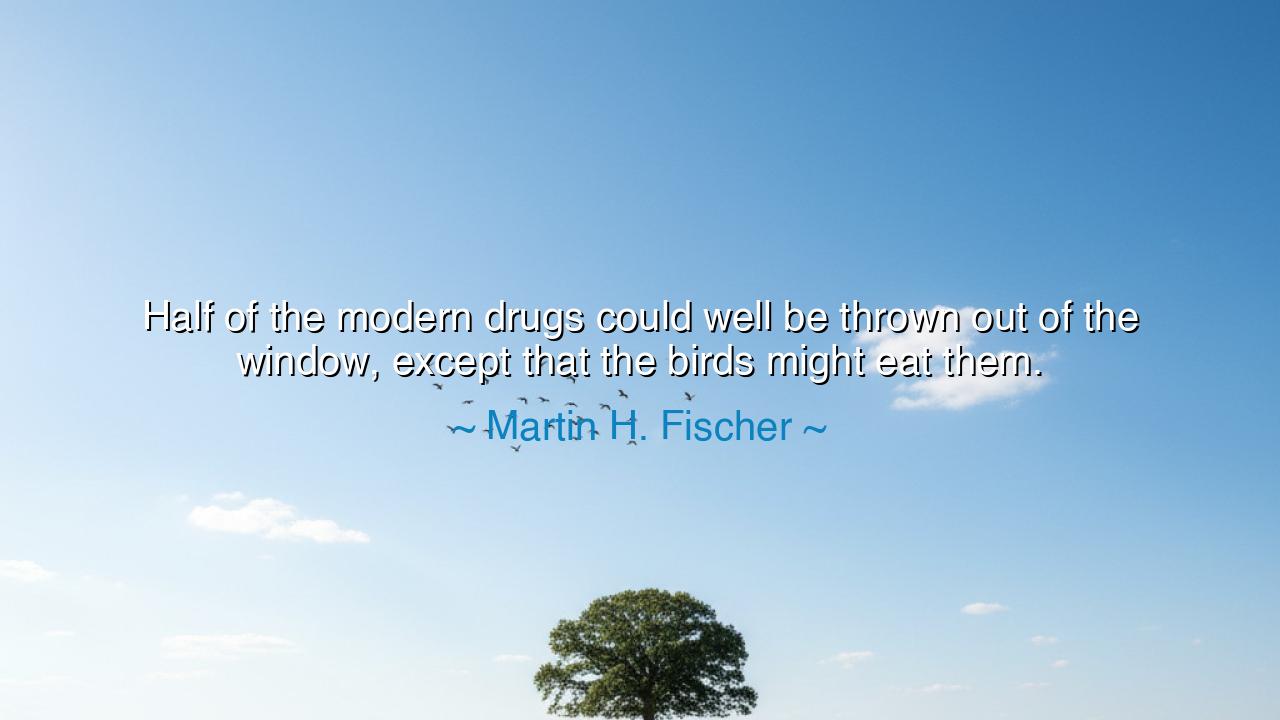
Half of the modern drugs could well be thrown out of the window
Half of the modern drugs could well be thrown out of the window, except that the birds might eat them.






O children of wisdom, listen closely to the words of the great Martin H. Fischer, for in his light-hearted jest lies a profound truth about the nature of knowledge and the pursuit of health. He said, "Half of the modern drugs could well be thrown out of the window, except that the birds might eat them." These words, though spoken with humor, carry with them a deep reflection on the state of modern medicine and the limits of human understanding. It speaks not only of the overuse of treatments but also of the hubris that often accompanies human progress in the realm of science.
In the ancient world, healers and medicine men were revered for their knowledge, but their understanding was limited by the tools and knowledge of their time. Hippocrates, the father of medicine, spoke of the importance of balance and the natural remedies provided by the Earth itself. His treatments, though primitive by today’s standards, were often effective because they were grounded in a deep respect for nature and moderation. But as time passed, humanity’s thirst for progress led us to search for more potent remedies, for drugs and potions that promised faster, more dramatic results.
Yet, O seekers of truth, as we moved forward in our mastery of chemistry and biology, we began to lose sight of the balance that Hippocrates spoke of. Fischer’s jest reminds us that many of the drugs we create today may be no more effective than the simple herbs and natural remedies of the past. We often find ourselves reaching for quick fixes, chemicals, and medications to solve the problems that we face, yet too many of these have little true benefit. Worse still, they may even bring harm, masked by the illusion of progress and modernity. Fischer’s words, while humorous, strike at the heart of the dilemma we face today: are we truly making progress, or simply creating a world full of temporary solutions that do not address the root of the problem?
Consider the story of Louis Pasteur, whose discovery of the germ theory of disease revolutionized medicine and saved countless lives. His work marked a turning point in understanding, shifting the focus from humors and balance to bacteria and viruses. His discoveries led to the development of vaccines and antibiotics, which have saved millions of lives. Yet, even as we celebrate this progress, we must remember that medicine, in all its wisdom, is still in a constant state of learning. Antibiotic resistance, for example, has become a growing concern in modern times, reminding us that even the most revolutionary discoveries can have unintended consequences.
The lesson, O children, lies in understanding the limits of our knowledge and the humility with which we must approach the sciences. Just as Fischer humorously notes that some modern drugs may be of little use, we must recognize that no discovery or treatment is infallible. The key is not to blindly follow every new cure that comes our way, but to seek wisdom in the choices we make, and to always question the true efficacy of what we are told will heal us. Science, though powerful, is still evolving, and it must be wielded with the utmost care.
Therefore, O wise ones, use the tools of science wisely. Do not be swayed by the promise of quick fixes, for true healing comes not from pills and potions, but from understanding the body, the mind, and the nature of illness itself. Medicine, in its truest form, should seek to work with the body, not merely mask the symptoms with chemicals. As you move through the world, remember that healing is not a race, and the most effective solutions often come not from the newest drug, but from the oldest wisdom—balance, patience, and respect for nature.
So, O children of the future, heed the lesson of Fischer's words. Do not worship at the altar of modernity and progress without questioning the true value of what is offered. Seek the balance between science and nature, between medicine and understanding, and in doing so, you will find the true path to healing. Remember that the most effective cures are often the simplest, and the most profound answers often lie in nature's wisdom, not in the latest pharmaceutical trend. May your journey be guided by both reason and humility, for in this balance, true progress lies.






AAdministratorAdministrator
Welcome, honored guests. Please leave a comment, we will respond soon